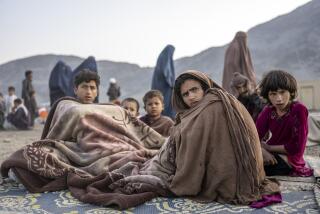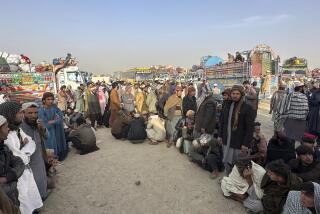Pakistan Cracks Down on Ex-Afghan Fighters : Diplomacy: 98 Muslims, many from Arab nations, are arrested and 3 are deported. The nation seeks to show it is not a haven for terrorists.
- Share via
PESHAWAR, Pakistan — For nearly a decade, they were the Jihadis, the devout Muslim fighters who flocked to this wild frontier city from across the Islamic world to join the jihad, the holy war against the Soviet invaders of neighboring Afghanistan.
The Russians retreated in 1989, but many of the fundamentalist warriors stayed for another war. And now, under growing pressure from the United States and several Islamic countries, Pakistani authorities have begun rounding up and arresting dozens of these former guerrillas, mostly from Arab countries, who are suspected of using this ancient tribal capital as a refuge for international terrorism.
The first three suspects were put on planes for Tunisia and Saudi Arabia on Sunday and Monday after a sweeping five-day crackdown in which Peshawar police picked up 225 people at roadblocks and in night raids on homes and offices. Many were later released after showing valid visas, work permits and other documents.
But police arrested 98 Muslims as illegal immigrants. They are being held under armed guard in a makeshift cell in a seedy police hall in Peshawar’s teeming Old City.
Those wanted on criminal charges in their home countries will be extradited and the others ordered to leave Pakistan, officials said.
Although the investigation and raids are continuing, a Western diplomat said by telephone Monday that none of those arrested so far has been found on international wanted lists for terrorism.
“But I think there’s some real concern to show Pakistan is not tolerating terrorism on its territory,” he said.
The prisoners are from across the Middle East and North Africa. Egypt, Algeria and Tunisia, whose governments face violent fundamentalist movements at home, have complained to Islamabad about allowing terrorist groups to operate in Peshawar and the mountains near Khyber Pass.
“We don’t want them around,” Abdul Basit Haqqani, a senior official in the Ministry of Foreign Affairs, said in a recent interview in Islamabad. “We want nothing to do with them.”
At least six of those arrested were armed and carried fake passports and visas, he added. “They are afraid of going back to their own countries. They are very, very scared. They will be dealt with very harshly in their own countries,” a senior police official said.
Pakistani Prime Minister Nawaz Sharif ordered the crackdown after he was publicly rebuked by Egyptian President Hosni Mubarak during a meeting two weeks ago when both were visiting Bonn. Mubarak complained particularly about Egyptians in Peshawar who are allied with the Gamaa al Islamiya fundamentalist movement.
The outlawed group has gunned down dozens of police officers and repeatedly attacked foreign tourists in Egypt in recent months. Their presence here was confirmed after a fax was sent to Cairo in January from Peshawar’s public telephone office warning foreign governments to evacuate their citizens from Egypt.
The Peshawar operator later identified four Egyptians from a local police photo book as having sent the fax to Cairo. But he was unable to pick out the four men, who work for Lajnat al Dawa al Islamia, a privately funded health and education program for refugees, from a subsequent police lineup, officials said.
The United States has also pressured Pakistan by placing the South Asian country on a watch list of countries suspected of sponsoring terrorism for its support of Muslim guerrillas fighting India in the disputed Himalayan state of Kashmir.
Pakistani officials publicly deny the allegations but privately concede that infiltration by armed guerrillas, especially in Kashmir, is inevitable. About 1,500 to 2,000 Kashmiris fought as volunteers each year in Afghanistan during the 14-year war, and many returned home as hardened combat veterans with arms, according to an intelligence official.
Although no direct links have been established, several figures prominent in the probe of the World Trade Center bombing in New York also visited wartime training camps in Peshawar, the major staging ground for the Afghan resistance. Mahmud Abouhalima, the Egyptian-born former taxi driver accused of masterminding the bombing, fought with the Afghan resistance in the late 1980s.
Ironically, it was the United States and Pakistan that helped recruit and arm many of the religious extremists as part of Washington’s proxy war against Moscow. Thousands of Arabs received training, sophisticated weapons and combat experience during the later years of the Afghan war, when the fighting was at its height.
Thousands of other Arabs stayed in Peshawar and other cities to work with Arab relief and religious organizations--including the Red Crescent Society--that provided aid to the 3 million refugees who fled the fighting.
More to Read
Sign up for Essential California
The most important California stories and recommendations in your inbox every morning.
You may occasionally receive promotional content from the Los Angeles Times.














